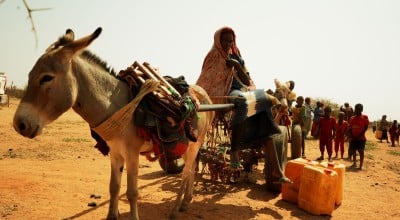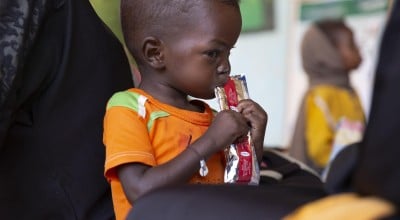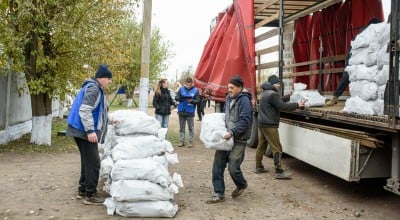
Read our 2024 annual report

Knowledge Hub
Samer and his family are Syrian refugees. His father, Ahmad* is unable to work due to a physical disability, leaving Samer with the heavy burden of financially supporting his family of six. As a result, Samer's emotional and social wellbeing started to drastically deteriorate.
From 8:00am to 9:00pm, 14-year-old *Samer worked in a grocery shop earning a meager 10 TL (Turkish Lira) a day (equivalent to €1.30 per day).
The United Nations High Commissioner for Refugees’ (UNHCR) latest Global Trends report shows that an unprecedented 79.5 million people were displaced by the end of 2019, that’s the equivalent to 1% of the world’s population, the highest that the UNHCR has ever seen. Half of which, are children.
This report comes to light just a few days prior to World Refugee Day, an international day marking the need for a more just, inclusive, and equal world for anyone who is displaced. Behind these harrowing figures are real people with real struggles, Samer’s story is just one of those 79.5 million people.
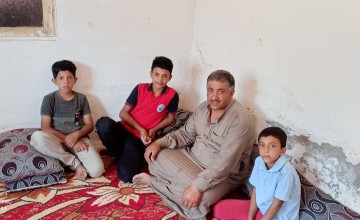
A difficult decision
Just two years ago, Samer was attending school like other children of his age group and excelled at his studies. Samer’s family are Syrian refugees who fled the conflict at home to reside in Turkey. His family were struggling financially and were dependent on the government of Turkey Emergency Social Safety Net (ESSN) payment of 720 TL (€93) a month (equivalent to 25TL / €3.13 per day). As this payment was not enough to support their family, Samer made the difficult decision to leave school early and start work.
Subsequently, in the two years that followed, Ahmad noticed his son’s emotional and social wellbeing deteriorating, but he didn't know how he could support him. Samer’s mood began to change and he became increasingly sadder, angrier, and nervous, while simultaneously isolating himself from the rest of the family.
Seeking help
When Ahmad visited one of Concern’s Protections Hubs in the districts of Sanliurfa province, in South East Turkey, he expressed his concern regarding his son’s emotional and social well-being and enquired if there was any psychological support available. Our team immediately informed him about all the services available and from there, took a holistic approach to support Samer and his family.
First, they discussed the negative consequences of child labour with Ahmad, in order to protect Samer and his right to education. They supported the family as a whole so they would not have to resort to similar negative coping mechanisms again. The family was referred to Concern’s 'Fighting Child Labour through Education' (FCLE) programme, which provides monthly incentives to families whose children are involved in the labour market, conditional on a 90% school attendance.
Secondly, because Ahmad noted that Samer seemed isolated, was often sad, nervous and becoming aggressive, the team registered Samer in the next cycle of Concern’s Psychosocial Support (PSS) programme. This Programme, supported by the European Civil Protection and Humanitarian Aid Operations (ECHO), is a 12-week, centre-based programme that helps children build resilience, improve well-being and develop relationships with themselves and with their peers.
Thirdly, Samer’s father and mother wanted to learn about different techniques to support their children, especially the social and behavioural challenges that Samer was facing. Based on this, the team enrolled Samer’s mother and father in Concern’s Caregiver Engagement (CGE) programme, which provides structured classes on key parenting techniques for challenges which are commonly faced, as well as providing a platform to discuss issues encountered within the household.
Opening up
Samer left his job at the grocery shop and enrolled back into school. Additionally, he and his two brothers were registered in the PSS programme. This was a positive step for all three children, as it helped them to open up and engage more with their peers. However, it was most beneficial for Samer, as his father reported that it helped him overcome the psychological effects of working in the grocery shop.
Gradually over the last three months, I started to feel that I am with a different child. The one that I knew before was nervous, isolated, and even seemed selfish. However, right now, thanks to the PSS activities, his sense of participation and involvement has developed noticeably. Even his relationship with his brothers has developed positively.
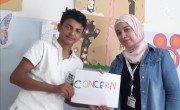
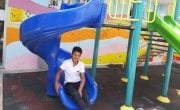
When Samer initially started attending the Protection Hub for the PSS course, he was shy and disengaged, not really showing any interest in the activities. However, the PSS facilitators and the psychological counsellor worked together to encourage him and build his confidence. Over time, he began opening up and became much more engaged with his peers.
Samer initially was so shy, isolated, and quiet but step-by-step, he started to show more engagement. Now he is one of the most active and engaged children in the cycle.
Even after the outbreak of COVID-19 and the subsequent suspension of activities at the Hub, Samer continued to improve and remained engaged with the PSS adpated courses. He loves to participate in the home-based recreational activities that his PSS facilitators share via a WhatsApp group three times a week. His mother and father say that Samer is even helping his younger siblings to be more active now.
He is sharing what he is learning from PSS activities with them. I am so happy that he overcame the challenges he faced from working. I cannot imagine what could have happened if I had not heard about the Protection Hub.
Lastly, after attending the weekly CGE sessions, as well as Information Counselling, Samer’s parents feel they are more prepared to support their children, as they have learned different techniques and strategies.
I want to keep learning, and benefiting from the experiences of others, and in return teaching others the lessons of life we have learned.
* All names have been changed for security reasons.
Follow us
Keep up to date with all of our work and hear more stories like Samer’s by following us on Instagram.



